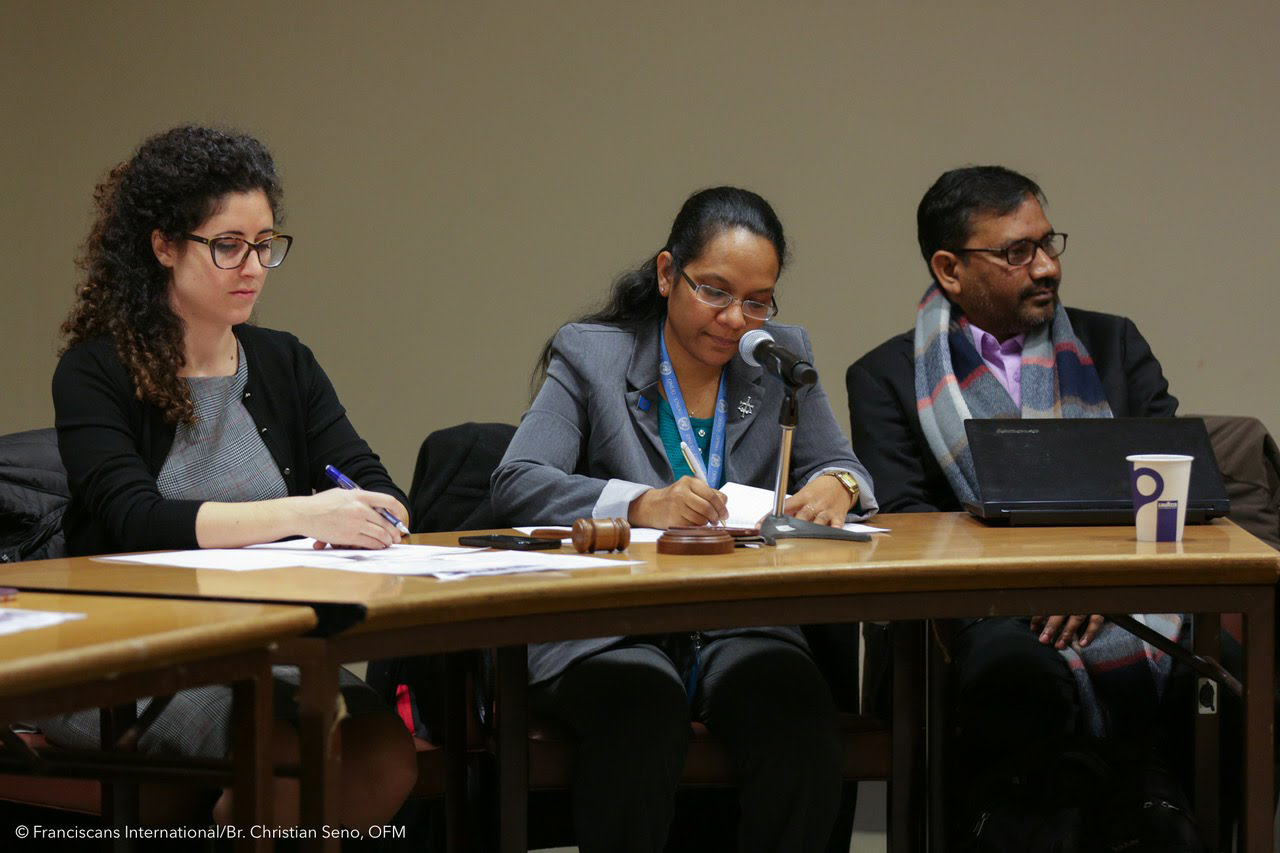The Congregations of St. Joseph was one of the main organizers and held a Side Event on 30 January 2018, during the fifty-sixth session of the Commission for Social Development (CSocD56) at the United Nations in New York, January 29-February 7, 2018. “Connecting Development and Human Rights in the eradication of extreme poverty: Strategies for the implementation of the 2030 Agenda” was the topic of the event, co-sponsored with Permanent Observer Mission of the Holy See to the UN and 9 other NGOs: Augustinians International, Fondazione Proclade Internazionale–Onlus, Franciscans International, International Presentation Association, Passionists International, Sisters of Charity Federation, Sisters of Notre Dame de Namur, Society of Catholic Medical Missionaries and the NGO Committee on Migration. “Social Inclusion” as the key for tackling economic exclusion was the central message of the side event. The panelists emphasized human rights and the work of religious organizations in combating extreme poverty globally. They suggested that communities with strong social cohesion are proven to catalyze sustainable development while respecting the dignity of every human person. The event focused on the priority theme of CSocD 56: “Strategies for eradicating poverty to achieve sustainable development for all.” Sister Justine Gitanjali Senapati,csj, UN Representative of the Congregations of St. Joseph, who helped moderate the event, began with a moment of silence in honor of the more than 700 million people throughout the world living under $1.90 a day, which is the definition of extreme poverty for the World Bank. Monsignor Tomasz Grysa, First Counselor of the Permanent Observer Mission of the Holy See to the UN, said, on behalf of Archbishop Auza, that religious communities play an essential role in ensuring the sustainable development agenda is implemented ethically. He told those gathered: “It’s essential for religious leaders, communities and believers — like so many represented today — to help provide, with courage and perseverance, what we could call the “soul” or “conscience” of the sustainable development agenda. . . . Just like anything good can be misused, if we exclude from our deliberations these deeper questions about the why-behind-the-what of sustainable development, then the enormous international developmental infrastructure could end up actually being used in some circumstances to undermine the very development and peace they were designed to advance.” Father Ajaya Kumar Singh, who was also one of the panelists for the this year’s Civil Society Forum, spoke of the vulnerable communities in Eastern India which he serves as the Director of Odisha Regional Forum for Social Action. Father Singh, who has experienced poverty himself and has first-hand knowledge of vulnerable groups such as Tribals, Dalits and religious minorities, raised the critical and complex situations of India. He said that while the country has many policies that promote economic development, the society’s caste system prevents the implementation of many of these policies. He stressed the need for social and cultural cohesion as key for human development. “You cannot speak only from the perspective of economics,” he said. “It is a question of human dignity, human rights and human respect.” In Southeast Asia, the Sisters of Charity promote economic and human developmental needs through community based cooperatives that provide skills training and microloans within the community. Their UN Representative, Sister Teresa Kotturan, shared the journey of a woman named Sabitri, who joined the women’s cooperative run by the Sisters of Charity, learned beekeeping and secured a loan to buy a small house. She taught her trade to her husband and he trained him in running his mushroom farm. The symbiotic skills enabled their family to become among the most successful farmers in Nepal. “The most important part is accompanying the people,” Sister Kotturan said. “We accompany them so that they themselves can be the decision makers, and they can take their destiny into their own hands.” Father John Rausch, an economist and missionary who works with impoverished Appalachian communities in Kentucky and Virginia, emphasized that authentic development is not limited to accessing to essentials like food, clothing, water, and shelter, but also includes a sense of belonging. “My work is the development of people,” he said. “It also entails promoting belonging to something that is going to propel them into a better life.” Sister Elsa Muttathu, a Presentation Sister of the Blessed Virgin Mary, shared a short video documentary that highlights the successes of 24 Zambian families her community serves through village-based cooperatives. The sisters promote not only economic wellbeing, but sustainable practices that respect the environment and lifelong learning. For example, if a tree needs to be cut for any reason, families must replace it with two trees. Another requirement is that for families to receive land on the cooperative, their children are required to receive an education. For many countries, deeply rooted cultural biases can be hurdles for economic advancement. Marina El Khoury, UN Representative for Franciscans International, who facilitated the discussion, said community-based cooperatives need to be a major strategy in economic development. “They put the person at the heart of what poverty eradication really means,” she said. The aim of the side event was to bring the voices and efforts of the grassroots initiatives to the United Nation’s platform. So the event presented some strategies used in a few countries: Eastern India, Nepal, Zambia and Eastern America.

